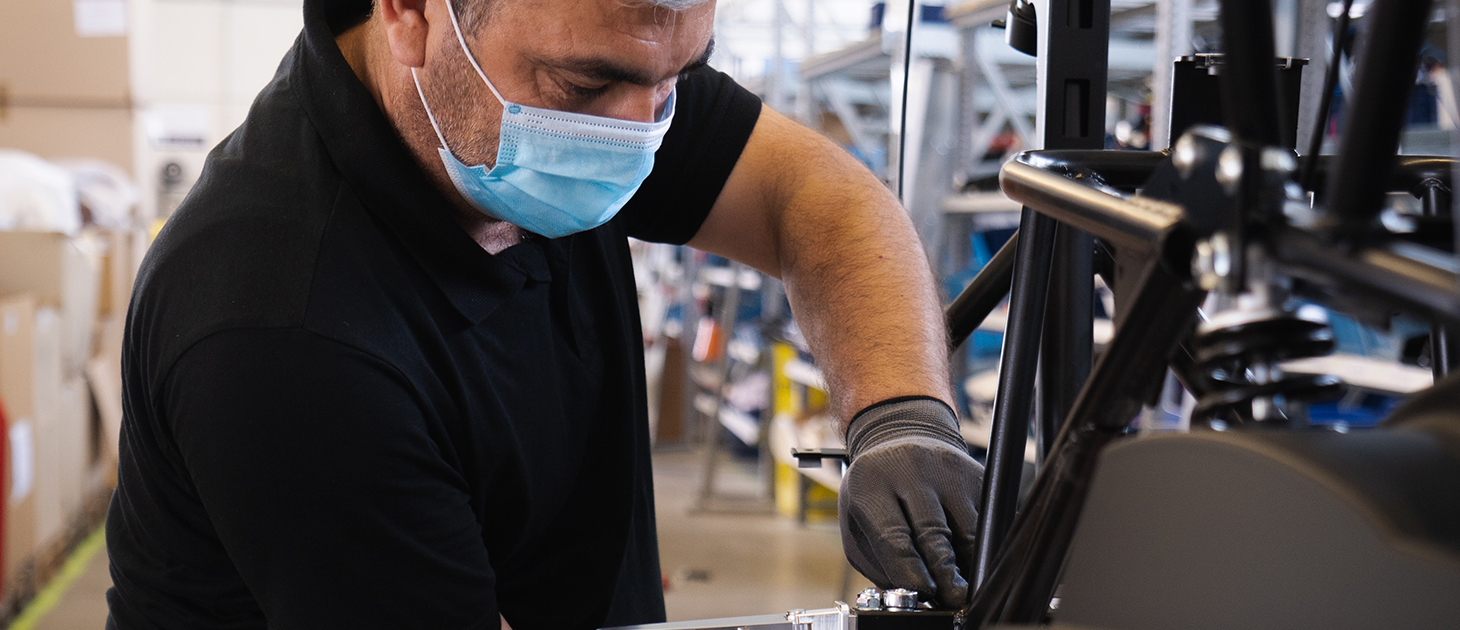The Right Thing
MiddleGround Capital's attitude toward its portfolio companies helped guide its manufacturing leaders through the COVID-19 pandemic.

For MiddleGround Capital Partner John Stewart, the foundation of a profitable manufacturing business isn’t found in a boardroom.
It’s located on the production line.
“I started as an hourly worker for Toyota Motor Corporation, putting bumpers on Toyota Camrys,” he says. “So, as an industrial investor, I have a great appreciation for the hourly workers, how important they are. When we do an acquisition, we may buy the assets of a company. But it’s nothing without the people inside.”
Given his perspective, the MiddleGround approach to private equity investment is unique.
The young firm, which was founded by Stewart and his partners Scot Duncan and Lauren Mulholland in 2018, is based in Lexington, Kentucky, with a satellite office in New York City.
“One thing that we like to do when we buy a company is go to every one of our sites and meet all of our employees face to face. We do townhall meetings; we shut the plants down and have a little presentation,” Stewart says. “We explain private equity using the analogy of buying a house, and how we add value as investors similar to the way you would when you buy a home for your family.
The goal is to demystify PE because it’s scary if you’re a worker and you hear you got bought by a New York private equity firm. We’ve found this approach really resonates well with employees. They get to know us and become comfortable with us as owners so we can do good things together.
John Stewart
Partner, MiddleGround Capital
“The goal is to demystify PE because it’s scary if you’re a worker and you hear you got bought by a New York private equity firm. We’ve found this approach really resonates well with employees. They get to know us and become comfortable with us as owners so we can do good things together.”
This attitude—that MiddleGround Capital is in a partnership with its portfolio company employees to create more value for everyone—guided its leaders’ thinking and planning as they heard the first whispers of the unfolding global COVID-19 pandemic in the earliest days of 2020.
Because of the types of businesses that MiddleGround invests in—B2B industrial manufacturers in the lower middle market headquartered in North America—and the long supply chains these organizations participate in, Stewart and his partners knew what was looming on the horizon long before most of us saw it coming.
A Proactive Approach to the Pandemic Reality
“We first started seeing some of the disruption that was going on in China,” Stewart says. “We were starting to get concerned with supply chain issues because of this situation with COVID. So, we formed a task force at the end of January with the CEOs of our companies.”
First, the pandemic affected shipments of products. In February, MiddleGround put travel restrictions in place for its employees and for its portfolio company employees. Thanks to early attention, the firm was also able to beat the rush on buying personal protective equipment. Then, at the beginning of March, as things were beginning to escalate but were still being played down, MiddleGround announced publicly via LinkedIn and to all of its employees that should anyone contract COVID or the flu, they would get paid to stay home and isolate. Or, if they came in contact with somebody who was ill and had to quarantine, they would still be paid.
“The reason we did this is hourly workers often come to work sick because they need to pay the bills,” Stewart says. “We wanted to put their minds at ease that they would continue to be paid. We announced this policy before any of the major employers.”
We wanted our people to know where they could safely go in the community for help and treatment, and we provided information in both English and Spanish to make sure everybody understood what was going on.
The MiddleGround task force consulted with medical professionals along with the CEOs and human resources personnel across its portfolio to put in a set of pandemic protocols and guidelines for everyone to follow.
“We had to look at cleaning the facilities, staggering breaks and lunches so people weren’t all congregating at the same time, and making sure that if someone did get sick, there were protocols for the facility to follow,” Stewart recalls of those early days. “This is all common today, but we developed protocols for employees before testing was really widespread. We had guidelines in place in March and contacted local health and safety experts, hospitals, urgent treatment centers, doctors’ offices, to ask, ‘Hey, what does an employee do if they think they have this virus?’ We wanted our people to know where they could safely go in the community for help and treatment, and we provided information in both English and Spanish to make sure everybody understood what was going on.”
The Bigger the Crisis…
When all of the shutdowns started happening at the end of March, MiddleGround leaders had to think longer-term about what to do with thousands of employees across its then five portfolio companies.
Suddenly, there was little demand. Businesses seized up.
Stewart thought back to his time at Toyota to guide his decision-making approach during the most difficult part of the year in late spring.
“When I worked at Toyota, as part of their executive leadership training, one of the lessons that we learned—and that I’ve always remembered—is the bigger the crisis, the longer the term you need to think about,” he recalls.
It was pretty clear that what was happening with the pandemic was unprecedented. The crisis wasn’t big; it was gargantuan. Thus, MiddleGround chose to think long-term. Its leaders announced to all of its employees that its companies would have no mandatory layoffs.
“We did this because we have a conscious ESG effort in our firm and we felt like it was the right thing to do,” Stewart explains, pointing to MiddleGround’s environmental, social, and corporate governance approach to doing business and measuring the sustainability of a given investment or decision.
“At the time, there was a lot of confusion. People were concerned about what was going on in the country and the world. Nobody knew how bad this was going to get, and we didn’t want to add to that drama for our employees,” Stewart says. “So, we came out publicly and announced that our employees would not have to worry about being mandatorily laid off. We would provide work for them in a safe manner. If we did not have demand from the customers, they’d perform maintenance on our equipment, get some training, or work on cleaning facilities … all kinds of different things. In states where they wouldn’t allow people to come to work, we paid people anyway. Our senior management teams didn’t have to make a mad scramble to try to lay people off, cut costs or make short-term decisions.”
Middleground is the only private equity firm in sub-billion dollar-global industrial buyouts that has signed up to be a un principles for responsible investment (PRI) signatory.1
Building Loyalty and Looking for Growth
Prior to the pandemic, it was very difficult for manufacturing companies across the board to hire skilled employees. While some may think hourly labor in a factory isn’t skilled, the fact is these people are very skilled. The jobs they do are challenging and difficult, and it’s hard to hire good people to work a complex production line.
Knowing this, Stewart’s biggest fear was that if his portfolio companies did lay off people, they wouldn’t be able to hire them back.
“I wanted to make sure that we retained people,” he says. “And it ended up being a great decision, though there was a lot of risk when we made it. As a first-time fund manager, I was worried about backlash from potential investors, because we made this declaration publicly. But I actually got nothing but praise from our investors for taking the high road.”
It ended up being quite savvy because the shutdown was short-lived and the third quarter of 2020 was explosive. MiddleGround companies had record months in the third quarter and were able to quickly capitalize on restored demand without skipping a beat—gaining loyalty from its senior management teams and from employees in the process.
Furthermore, though MiddleGround Capital is very young, its team did not let up on deal-making in 2020. It closed one deal in May, two in August, and announced another December 1 on a company called Shiloh Industries, a global supplier of lightweighting, noise and vibration solutions to the automotive and commercial vehicle industries.
Stewart attributes his firm’s growth during this challenging year to the extra effort he and the other partners are willing to make to close deals.
It’s the blue-collar mentality of our firm. We’re not afraid to get our hands dirty. Yes, we have safety protocols; we’ve only had one member of our firm come down with Covid. We make sure we have a very safe workplace, but sometimes it pays just to be the guy who shows up.
“It’s the blue-collar mentality of our firm,” he says. “We’re not afraid to get our hands dirty. Yes, we have safety protocols; we’ve only had one member of our firm come down with COVID. We make sure we have a very safe workplace, but sometimes it pays just to be the guy who shows up. For the deal we just closed, for example, we were told we were the only people that went and visited the plants. We were the only people that met the management team. When the seller decided to sell, they said, ‘Well, you’re not the highest price but we think you’re the only people that actually understand what this business does.’”
A Commitment to People
Going into the pandemic, most of MiddleGround’s companies were in a good situation. Because of its operational strategy, the firm had already paid down a significant part of their debt.
“We rely more on what we can do to affect the business and create equity value than we do leverage,” Stewart explains. “We were not the type of investor that puts 25% or 30% equity in the deal and then wants to maximize leverage. We underwrite, in our transactions, that the actions we can take to improve the company based on our operations expertise will generate 35% or more of the return in the company. It just takes the pressure off. We have modest levels of debt and we’re still underwriting to really good returns. A lot of other private equity firms can’t compete with that because that’s not part of their formula.”
The COVID situation stress-tested this strategy—and proved it to be a good one.
Stewart believes the events of 2020 increased the conviction its investors have in his firm’s ability to deploy capital and do right by all stakeholders—in essence, leaving things better than it finds them.
“The motto that we came up with this year is it feels good to do the right thing,” Stewart reflects. “And it’s really nice to have investors appreciate you doing the right thing. After posting that there would be no layoffs, I got an email from a CIO of one of the endowments that is a public pension and my largest investor. They said, ‘You’re doing exactly the right thing. We’re proud to be partners with you.’
“You know, it feels good.”
John Stewart is the co-founder of MiddleGround Capital and the author of Toyota Kaizen Continuum: A Practical Guide to Implementing Lean.

Laura Schaefer is a freelance writer and author based in Orlando, Florida.


